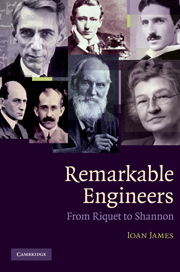Book contents
- Frontmatter
- Contents
- Preface
- Prologue
- 1 From Riquet to Watt
- 2 From Jessop to Marc Isambard Brunel
- 3 From Trevithick to Sadi Carnot
- 4 From Henry to Bazalgette
- 5 From Eads to Bell
- 6 From Braun to Hertz
- 7 From Diesel to Marconi
- 8 From Pal'chinskii to Zworykin
- 9 From Gabor to Shannon
- Epilogue
- Bibliography
- Credits
- Image credits
Epilogue
Published online by Cambridge University Press: 17 December 2010
- Frontmatter
- Contents
- Preface
- Prologue
- 1 From Riquet to Watt
- 2 From Jessop to Marc Isambard Brunel
- 3 From Trevithick to Sadi Carnot
- 4 From Henry to Bazalgette
- 5 From Eads to Bell
- 6 From Braun to Hertz
- 7 From Diesel to Marconi
- 8 From Pal'chinskii to Zworykin
- 9 From Gabor to Shannon
- Epilogue
- Bibliography
- Credits
- Image credits
Summary
As we have seen, the kinds of people who were attracted to engineering as a career were quite various. Some, such as Vauban, Brindley, Telford, the elder Stephenson, Ayrton and Woods, and perhaps also Edison, grew up in the shadow of poverty. Several, such as Riquet, Trevithick, Marc Brunel, Diesel and Lanchester, fell seriously into debt in the course of their careers. A few, like Cayley, Parsons and von Braun were born into wealthy families. They differed greatly in their social background and their degree of education. Engineers, however distinguished, were seldom accepted into the scientific academies. Instead they formed societies or other bodies to regulate their branch of the profession. Four engineers, namely Braun, Marconi, Gabor and Shockley won Nobel Prizes. Telford, the younger Brunel, Bazalgette and Parsons were knighted; Vauban, Thomson and Marconi were ennobled. Cayley and von Braun inherited a title.
The job of the practising engineer varies enormously according to the speciality. The work of a civil engineer, for example, might involve planning, costing and organizing the construction of something, dealing with legal problems and managing a work force. A mechanical engineer, might expect to design, manufacture, install and maintain machinery. There are also different ranks, different levels of skill, knowledge and responsibility, and different official or unofficial levels of status. However, any engineer requires a good business sense if he is to succeed. He also needs to develop managerial skills, to deal with contractors and employees, both skilled and unskilled.
- Type
- Chapter
- Information
- Remarkable EngineersFrom Riquet to Shannon, pp. 188 - 190Publisher: Cambridge University PressPrint publication year: 2010



